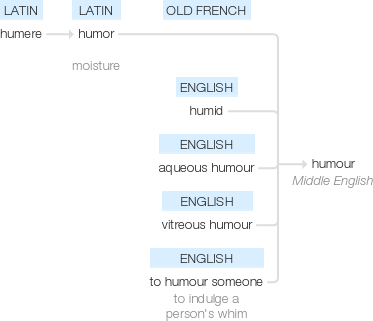Humour
Middle English: via Old French from Latin humor ‘moisture’, from humere (see humid). The original sense was ‘bodily fluid’ (surviving in aqueous humour and vitreous humour ); it was used specifically for any of the cardinal humours (humour (sense 3 of the noun)), whence ‘mental disposition’ (thought to be caused by the relative proportions of the humours). This led, in the 16th century, to the senses ‘mood’ (humour (sense 2 of the noun)) and ‘whim’, hence to humour someone ‘to indulge a person's whim’. humour (sense 1 of the noun) dates from the late 16th century.
wiktionary
From Middle English humour, from Old French humor, from Latin humor, correctly umor(“moisture”), from humō, correctly umō(“to be moist”).
etymonline
humour
chiefly British English spelling of humor; see -or. Related: Humourous; humourously; humourist; humourless, etc.
